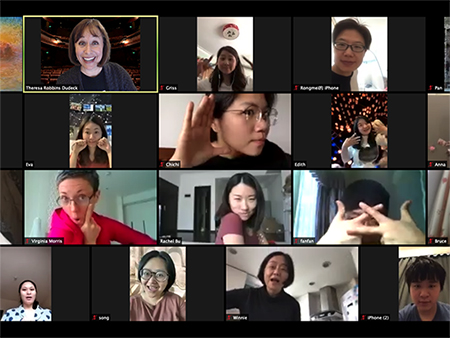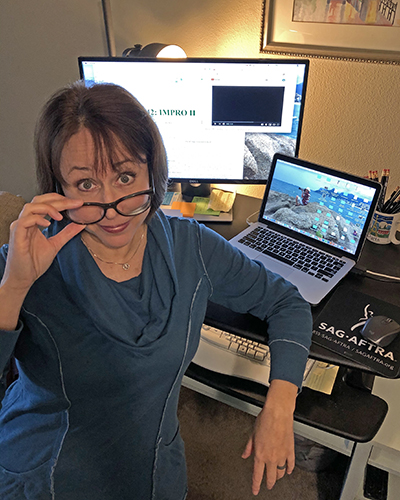 While performances may be temporarily sidelined, performers are still engaged in learning all they can.
While performances may be temporarily sidelined, performers are still engaged in learning all they can.
New opportunities and enhanced skills for actors can be found via virtual classes, says Theresa Robbins Dudeck, Ph.D., a University of Alabama at Birmingham graduate and 2019-2020 U.S. Fulbright Scholar with expertise in applied improvisation. This downtime without live performances is a valuable opportunity for learning the craft, mastering skills like new dialects, reading about acting, watching recorded performances, building a professional website, journaling and more.
Dudeck teaches improv for theater students and professional actors and facilitates applied improvisation trainings for organizations and communities. She earned her bachelor’s degree from the College of Arts and Sciences’ Department of Theatre in 1992. This summer, she is virtually teaching two courses as a guest faculty member for Artists Repertory Theatre in Portland, Oregon: Improvisation for Actors and Improvisation for Collaborating, Creating and Connecting. As have so many theaters, ART has suffered huge losses because of the pandemic; but the education programs are going forward, she says. Dudeck shared her thoughts on new ways of learning and connecting in theater.
The improvisation mindset
“Impro and having an impro mindset are about balancing between structure and surprise; about being comfortable with uncertainty; about treating everything that life throws at us as an offer. So, although teaching virtually over the last six months has been challenging, having an impro mindset allowed me to approach this moment as an opportunity to shake things up and to discover how a virtual platform could take improvisation in new directions.”
On teaching improv online
“In person, I teach a very physical improvisation grounded in the work of Keith Johnstone. But the theories underpinning the exercises and games are for actors and for people who want to connect more authentically. On Zoom, I have discovered that these little virtual boxes have encouraged students to connect in more nuanced, honest ways. Facial expressions have become more important, as has imagining the space you are in differently. Also, because there is a slight time lapse on Zoom and/or internet connection speeds vary, students have had to engage in more responsive, deeper listening. It’s almost impossible to talk over someone in Zoom, and technical issues often disrupt the flow; the virtual ‘stage’ requires additional patience, focus and benevolence — skills actors should continually develop anyhow.”
 How the pandemic impacted her professionally
How the pandemic impacted her professionally
“I teach in both academic and professional settings. At first, when we were given the stay-at-home order in Portland, Oregon, (where I am currently based) much of my additional theater and applied improvisation corporate training work dried up. But slowly, as more and more folks got comfortable with virtual trainings and classrooms (and because I’m rather proficient at Zoom!), I’ve been virtually invited into meetings and theater classrooms all over the world. I was even able to recently reconnect with my students from Hong Kong, Beijing, Shanghai and Guangzhou without traveling to China. Instead, we were able to reunite over a three-hour virtual impro/applied impro workshop, and it was joyous.”
How this time of learning virtually can actually strengthen actors
“I would like to jump back to listening or ‘responsive listening,’ as actor/improviser Alan Alda calls it. Responsive listening denotes a deeper listening, more than just hearing the words. This kind of listening separates the great actors from the mediocre ones. Great actors and improvisers listen with their whole body. They listen for subtext, emotion, tone of voice, body language, and they listen to understand. A great actor/improviser is altered by what is said or given to them, which expresses a willingness to be vulnerable. After all, when you really listen to understand, there’s a greater possibility that you will be changed. The virtual environment is where actors can develop those listening skills, to really tune into others and to subtle behavioral cues that often get missed in large acting classrooms. One of my favorite theater directors, Anne Bogart, wrote: ‘Listening is a creative act, and it can be an act of love. To pay attention changes us and changes the object of our attention.’
“Pay close attention and responsively listen to your acting partners out of respect and love but also to become more aware of subtle human behaviorisms, whether conscious or subconscious. Respond to what is happening over there, in your partner’s little virtual box, and commit to the encounter; that is, let it change you.”
Her advice to theater students during this time
“Keep working on your craft. The world needs artists now more than ever, and the theater will survive, as it has done for 2,500 years. The theater of the future will look different, but that is OK. The theater’s ability to transform and change and respond to the current moment is exactly why it has had an essential and unique place across time and space.
“Consistency in theater and acting is deadly. Take this moment to work on your craft differently. Do play readings over Zoom with your peers. Master a few dialects. Get your personal website up and running. Take advantage of the free, filmed performances being offered by some of the greatest theaters in the world. Take virtual workshops with master teachers who live in places that would be hard to travel to in person. Read books about acting (I recommend ‘Impro: Improvisation and Theatre’ by Johnstone), write or journal daily, work through ‘The Artist’s Way’ and a selection of anti-racism books. Be mindful; intentionally take inventory of several new things every day. Respond to the moment creatively, passionately, thoughtfully, spontaneously and empathetically.
“This is how you build your actor’s toolbox. Finally, instead of judging this moment as a negative disruption, think like an improviser and accept it as an offer you can build upon.”
Dudeck is co-director of “On Keith: Artists Speak on Johnstone & Impro” YouTube docuseries. She is the author of “Keith Johnstone: A Critical Biography” (Bloomsbury, 2013); co-founder, Global Improvisation Initiative; and co-editor, “Applied Improvisation: Leading, Collaborating, and Creating Beyond the Theatre” (Methuen Drama, 2018). She can be found online at www.TheImprofessor.com.